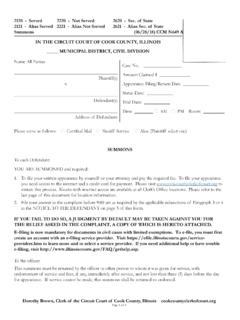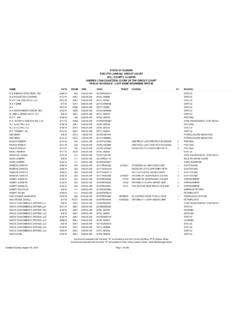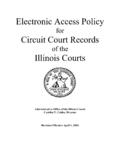Transcription of SUPREME COURT OF ILLINOIS In re: Mandatory …
1 IN THE. SUPREME COURT OF ILLINOIS . In re: Mandatory electronic filing In civil Cases 18368. ORDER. The exchange of information required to resolve disputes in COURT has, until the past quarter century, relied almost exclusively on paper documents. Technology has since evolved to provide for the automated exchange of COURT information. COURT users, including self-represented litigants, increasingly benefit from paperless COURT systems that allow for electronic filing , service and access to case documents. The SUPREME COURT of ILLINOIS has adopted numerous rules, policies and initiatives to promote e- filing with the goal of fostering the effective and efficient administration of justice. Advances in e- filing were initiated on September 19, 2002, when the COURT filed Order 18368 authorizing the electronic filing of documents with the SUPREME COURT on a pilot basis.
2 However, after several years, only five counties were operating under the pilot program . To encourage expansion of e- filing , the COURT approved electronic filing Standards and Principles on October 24, 2012, thereby concluding the pilot status of civil case e- filing and authorizing permanent e- filing upon circuit COURT request and COURT approval. In September 2014, the COURT amended the electronic filing Standards and Principles to include e- filing in criminal case types and traffic citations. Yet, to date, only 15 of 102. ILLINOIS counties have sought and been granted approval for e- filing . The scant use of e- filing statewide brings to bear what the SUPREME COURT has long recognized -- the barriers to statewide e- filing revolve primarily around the wide variances in funding and technology resources available to the state's 24 circuit courts, including the 13 different case management systems currently operating in ILLINOIS .
3 Committee Review and Recommendations To address this challenge, the Technology Committee of the Conference of Chief Circuit Judges was tasked in 2013 with considering statewide standardization of data definition and exchange methods for e- filing and e-records. On June 21, 2013, the committee included within its recommendations to the Conference the conclusion that statewide e- filing efforts wi ll develop if courts are mandated to e-file and follow a common set of standards for data packaging and organization. 1. On November 26, 2014, the COURT created the e-Business Policy Advisory Board and Technical Committee comprised of judges, COURT clerks, attorneys and COURT technology personnel. The e-Business Policy Board is charged with providing recommendations, advice, and guidance to the SUPREME COURT and its Administrative Office of the ILLINOIS Courts regard ing the implementation of e-Business applications and data exchanges in ILLINOIS circu it courts.
4 On December 15, 2015, the e-Business Policy Board made several recommendations to the COURT , including: (1) set a date certain for the implementation of Mandatory e- filing of civil cases for all counties in the state; (2) require a single e- filing manager (EFM) to integrate e-filed documents into the case management systems of all counties not presently approved to conduct e- filing ; and, (3) allow counties currently approved fore- filing to continue with their current e- filing systems, including EFMs, until one year after the centralized EFM has been operational for all other counties in the state, during which time a review should be conducted to recommend a date certain for those counties to begin using the centralized EFM for the e- filing of civil cases.
5 In spite of the rules, policies and standards in place, the implementation of discretionary e- filing programs has not achieved the desired goal of statewide e- filing on civil matters. As such, in reliance upon the recommendations of multi-disciplinary committees, boards, and COURT staff who have spent years evaluating this issue, this COURT concludes that e- filing in civil cases in ILLINOIS must be made Mandatory . THEREFORE, IT IS ORDERED that: 1. This Order governs e- filing in civil cases for the ILLINOIS SUPREME COURT , ILLINOIS Appellate COURT and ILLINOIS Circuit Courts. 2. E- filing of civil cases shall be Mandatory in the ILLINOIS SUPREME COURT and the ILLINOIS Appellate COURT effective July 1, 2017. 3. E- filing of civil cases shall be Mandatory in ILLINOIS Circuit Courts effective January 1, 2018.
6 4. In the ILLINOIS SUPREME COURT and ILLINOIS Appellate COURT , e- filing of civil cases shall occur consistent with applicable policies, guidelines and/or standards authorized by the SUPREME COURT and through the utilization of a centralized electronic filing manager (EFM) authorized by the SUPREME COURT . The centralized EFM shall be integrated with the SUPREME COURT Clerk and the five ILLINOIS Appellate COURT Clerk case management systems. 5. In all Circuit Courts which have not implemented an authorized local e- filing program by the filing date of this Order, e- filing of civil cases shall occur per the applicable policies, guidelines and/or standards authorized by the SUPREME COURT , and through the utilization of a centralized electronic filing manager (EFM).
7 2. authorized by the SUPREME COURT . The centralized EFM shall be integrated with each Circuit COURT 's case management system. 6. In all Circuit Courts operating an approved local e- filing program by the filing date of this Order, e- filing of civil cases shall occur per the applicable policies, guidelines and/or standards authorized by the SUPREME COURT , and through the utilization of an electronic filing manager (EFM) authorized by the Chief Circuit Judge and Circuit Clerk or the centralized EFM authorized by the SUPREME COURT . After January 1, 2018, and following evaluation of the implementation and operation of the centralized EFM, the SUPREME COURT may designate a future date certain at which time all such Circuit Courts shall utilize the centralized EFM.
8 Authorized by the SUPREME COURT for the e- filing of civil cases. The centralized EFM shall be integrated with each Circuit COURT 's case management system. 7. Once a COURT is subject to Mandatory e- filing under this Order, attorneys and self- represented litigants must e-file all documents in civil cases, except documents exempted by rules adopted by this COURT . Attorneys and self-represented litigants may not file documents through any alternative filing method, except in the event of emergency. Courts may not accept, file or docket any document filed by an attorney or self-represented litigant in a civil case that is not filed in compliance with this Order, except in the event of an emergency. The SUPREME COURT , Appellate COURT and Circuit Courts must provide designated space, necessary equipment, and technical support for self-represented litigants seeking to e-file documents during regular COURT hours.
9 8. Effective July 1, 2017, all trial COURT records on appeal will be standardized and transmitted using the central electronic filing manager (EFM) service from each county to the respective reviewing COURT . 9. The SUPREME COURT will adopt rules governing a- filing and a-service in accordance with the mandate schedule in this Order. 10. Courts who believe they cannot comply with this Order by the Mandatory implementation date specified may petition the SUPREME COURT for an extension. Such extensions shall not be favored but may be granted for good cause shown. Order entered by the COURT . FILE D. JAN 2 2 2016. SUPREME COURT . CLERK. 3.






